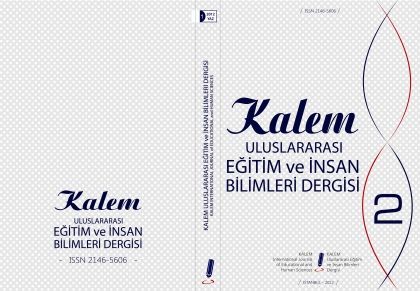Dr. Osman SEZGİN - Doç. Dr. Ramazan BİÇER
Türk Kültüründe Hoşgörünün Temelleri
Abstract
|
Full Text
Turkish culture is based on tolerance, the product of the unique Islam-Turkish synthesis. This synthesis is crucial today for a more balanced perception of Islam because it opposes extremism and the terror that is associated with it. The Turkish-Ottoman Em-pire followed earlier traditions and set up a system based on tolerance towards its ethni-cally diverse subjects. It was due to this exceptional system assuring stability and freedom of conscience that the Empire was able to hold together people of different religions, languages and races, and to protect and preserve different cultures and languages. This tradition of tolerance and harmony lives on in modern Turkey. Although today there are bound to be certain misinterpretations of Islam, the majority of Turks firmly oppose intolerance and terrorism.
Yrd. Doç. Dr. Emine Nihal AHİOĞLU LINDBERG
Parent-Child Scaffolding Interactions in Daily Life
Abstract
|
Full Text
In this research, daily interactions between 4-5 years old children and their parents coming from low socioeconomic status were studied. The goal was to define daily interactions between parents and children with 4-5 years old according to content of the cognitive themes of interactions. Seven families participated to the research. Participant observation technique was used for data gathering. The data was analyzed according to categories: with whom children interact; scaffolding behaviors of parents in cognitive based interactions and finally children outcomes in these interactions. The analyses of parental scaffolding behaviors were included four themes as verbal strategy, direct support / help, modeling and complete the task without children involvement. The verbal strategies were analyzed to five subcategories as take attention, keep attention on task, make general / specific verbal explanations, give feedback and say / do something irrelevant to the task. Children’ outcomes were analyzed to pay attention, endeavor to solve problem, to follow/not follow the cues related with problem solving, ask for help verbally or nonverbal, disclaimer to work on the task, completed task by her/himself. It was found that observed 107 interactions was started by mother. Parent used verbal strategies more than others. Mostly used verbal strategies were respectively taking attention, make general / specific verbal explanations, and give feedback. Children common outcome for the parents’ behavior was to complete the task by their selves. The following outcomes were respectively paying attention to the explanations of parents and not following the cues related with problem solving.
Prof. Dr. Özcan DEMİREL - Yrd. Doç. Dr. Cevdet EPÇAÇAN
Effects of Reading Comprehension Strategies on Cognitive and Affective Learning Outcomes
Abstract
|
Full Text
The purpose of this study is to determine effects of Coop-Dis-Q and POSSE reading comprehension strategies on 5. graders cogni-tive and affective levels. Pretest – posttest with control group experi-mental design model has been used in the research. Quantitative data collecting instruments were used in the research. Quantitative data obtained by administration of cognitive entry test for Turkish course, test of reading comprehension, self-efficacy belief scale for reading comprehension and attitude scale related to Turkish l course,. In the analysis of quantitative data statistical operations were performed by practicing SPSS packet program. Descriptive analysis was used in an-alyzing of qualitative data. According to results obtained from quanti-tative and qualitative data, Coop-Dis–Q and POSSE reading compre-hension strategies has been more effective than conventional instruc-tion in increasing level of reading comprehension, in developing atti-tudes related to Turkish course and in rising self- efficacy beliefs re-lated to reading comprehension.
Dr. Özer ÇETİN
Blood Symbolism in Points of Crosscultural Psychology of Religion
Abstract
|
Full Text
Human attributes the symbolic meanings to some objects in his environment. From past to today, one of these objects is blood. The symbolism of blood is seen similarly in most cultures. The psycholo-gical, cultural and religious factors play an active role at the blood symbolism. Except for biological characteristics, such as sacred, pro-tection and purfication, symbolic meanings are attributed.
The belief that soul is carried in blood and some expressions at the holy texts caused blood to be made it holy. After this stage, it is aimed to get benefit from the blood. The effect of sense of protection and purification, individual tends to blood rituals that they are offered by cultural environment. Generally, blood sliding ritual is used com-monly at the most cultures. The goal of this ritual is transfer the me-taphysical forces on the point where it is overlooked blood on it. Thus, the powers that believed to be stocked in blood are hoped that they will protect the person or object and will purify the person from his sins.
Yrd. Doç. Dr. Bülent ALCI - Yrd. Doç. Dr. Gülru YÜKSEL
İngilizce Öğretmenliği Lisans Öğrencilerinin Özyeterlik ve Bilişüstü Algılarının Farklılaşması ve Akademik Performanslarını Yordaması
Abstract
|
Full Text
The aim of this study is of twofold: to examine in what degree the under-graduate ELT students’ sense of self-efficacy and metacognitive awareness predict their academic performance, and to investigate the difference in self-efficacy beliefs and metacognitive awareness according to grades. The study cohorts a total of 143 students enrolled in English Language Teaching department. In the study two different instruments were used: Teachers’ Sense of Self-Efficacy Scale (TSES) (Çapa, Çakıroğlu and Sarıkaya, 2005) and Metacognitive Awareness Inventory (MAI) (Schraw and Dennison, 1994). The correlation analysis suggested relation between
self-efficacy, metacognition and academic success. Yet, the regression analysis showed that only metacognitive awareness predicts academic performance. ANOVA analysis displayed statistically significant differences in self-efficacy and metacognitive awareness scores between groups.

